Nursing Knowledge: Philosophy to Practice - Assignment Essay
VerifiedAdded on 2023/04/19
|13
|4106
|182
Essay
AI Summary
This essay delves into the philosophy of nursing, specifically examining person-centred care through the lens of a clinical placement experience. The introduction describes a scenario involving a patient with multiple communication barriers and the implementation of care strategies tailored to his needs, including written communication and BSL facilitated by a family friend. The essay then explores the historical and political influences on nursing, tracing its evolution from ancient times to the present, highlighting key figures like Florence Nightingale and the professionalization of nursing. The core of the essay centers on the philosophical underpinnings of nursing, particularly person-centred care, referencing theories like mind-body dualism, Jean Watson's Theory of Human Caring, and the concept of compassion. The author discusses the practical application of these philosophies in the case scenario, emphasizing the importance of respecting patient values, involving them in decision-making, and addressing their individual needs. Ethical considerations, such as communication challenges and the importance of patient education, are also addressed. The essay concludes by reiterating the benefits of a holistic approach, emphasizing the impact of person-centred care on patient outcomes and satisfaction. The essay highlights key attributes like coordinated support, personalized care, and patient empowerment, reinforcing the significance of understanding and respecting the patient's experience and perspective.
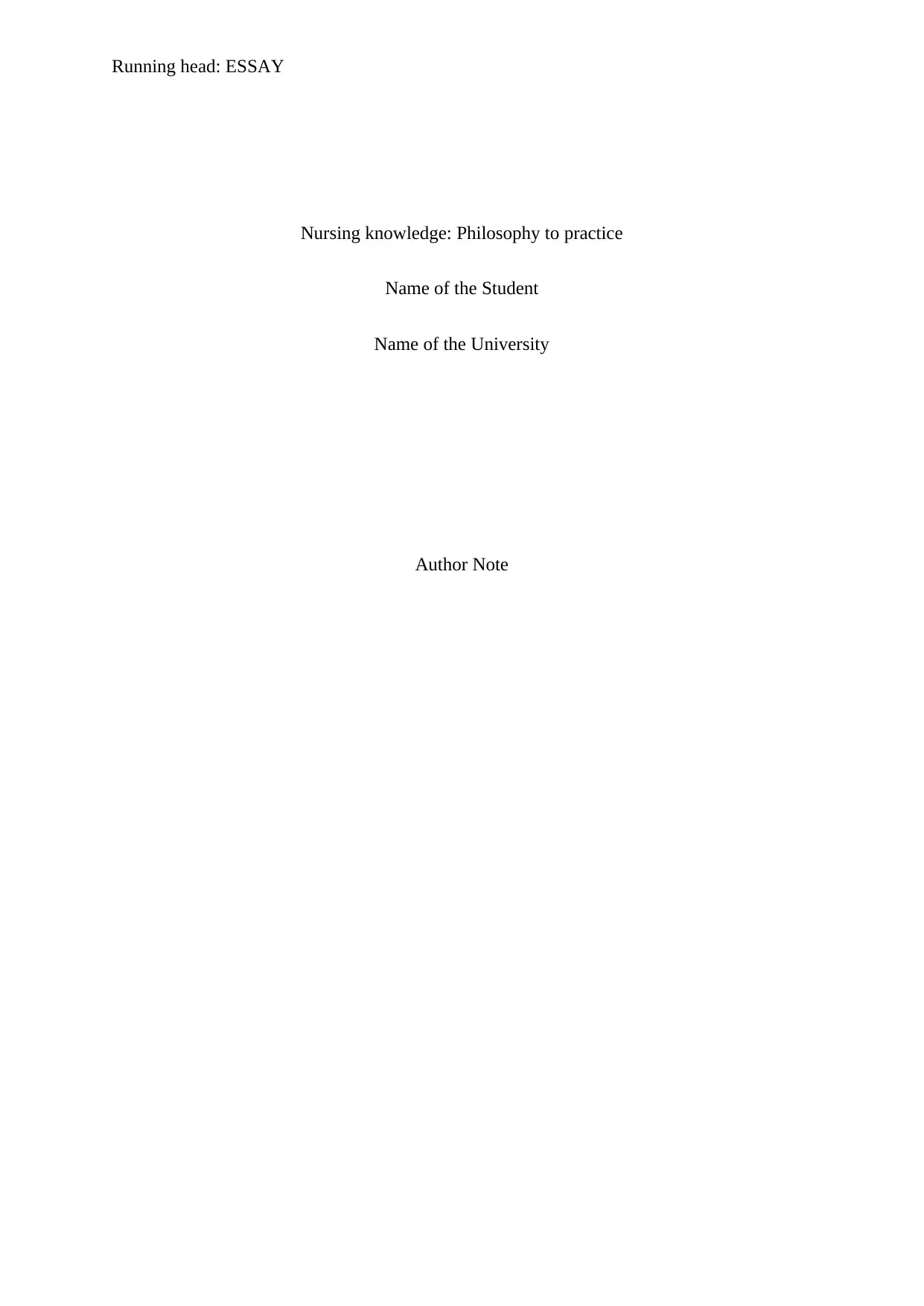
Running head: ESSAY
Nursing knowledge: Philosophy to practice
Name of the Student
Name of the University
Author Note
Nursing knowledge: Philosophy to practice
Name of the Student
Name of the University
Author Note
Paraphrase This Document
Need a fresh take? Get an instant paraphrase of this document with our AI Paraphraser
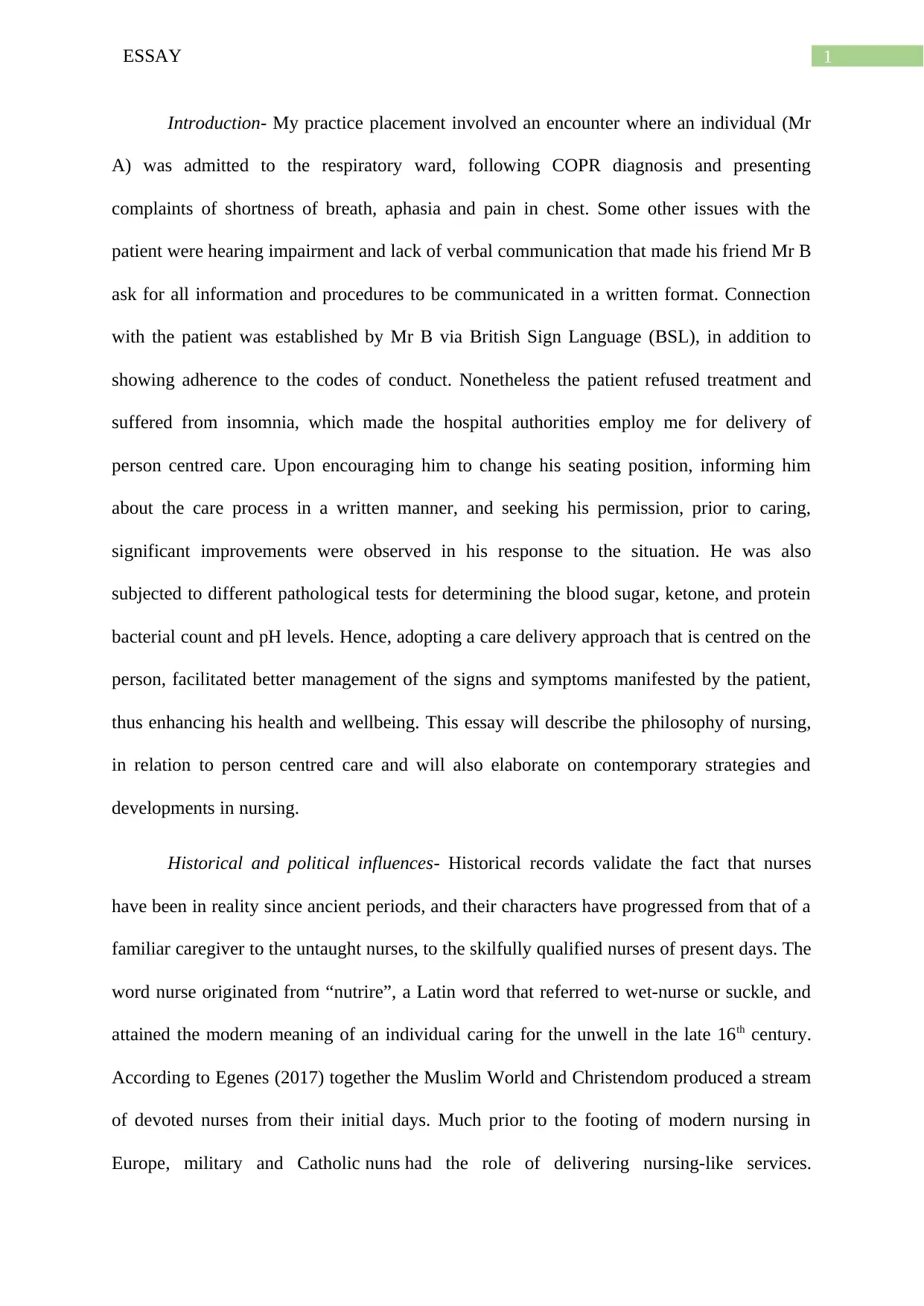
1ESSAY
Introduction- My practice placement involved an encounter where an individual (Mr
A) was admitted to the respiratory ward, following COPR diagnosis and presenting
complaints of shortness of breath, aphasia and pain in chest. Some other issues with the
patient were hearing impairment and lack of verbal communication that made his friend Mr B
ask for all information and procedures to be communicated in a written format. Connection
with the patient was established by Mr B via British Sign Language (BSL), in addition to
showing adherence to the codes of conduct. Nonetheless the patient refused treatment and
suffered from insomnia, which made the hospital authorities employ me for delivery of
person centred care. Upon encouraging him to change his seating position, informing him
about the care process in a written manner, and seeking his permission, prior to caring,
significant improvements were observed in his response to the situation. He was also
subjected to different pathological tests for determining the blood sugar, ketone, and protein
bacterial count and pH levels. Hence, adopting a care delivery approach that is centred on the
person, facilitated better management of the signs and symptoms manifested by the patient,
thus enhancing his health and wellbeing. This essay will describe the philosophy of nursing,
in relation to person centred care and will also elaborate on contemporary strategies and
developments in nursing.
Historical and political influences- Historical records validate the fact that nurses
have been in reality since ancient periods, and their characters have progressed from that of a
familiar caregiver to the untaught nurses, to the skilfully qualified nurses of present days. The
word nurse originated from “nutrire”, a Latin word that referred to wet-nurse or suckle, and
attained the modern meaning of an individual caring for the unwell in the late 16th century.
According to Egenes (2017) together the Muslim World and Christendom produced a stream
of devoted nurses from their initial days. Much prior to the footing of modern nursing in
Europe, military and Catholic nuns had the role of delivering nursing-like services.
Introduction- My practice placement involved an encounter where an individual (Mr
A) was admitted to the respiratory ward, following COPR diagnosis and presenting
complaints of shortness of breath, aphasia and pain in chest. Some other issues with the
patient were hearing impairment and lack of verbal communication that made his friend Mr B
ask for all information and procedures to be communicated in a written format. Connection
with the patient was established by Mr B via British Sign Language (BSL), in addition to
showing adherence to the codes of conduct. Nonetheless the patient refused treatment and
suffered from insomnia, which made the hospital authorities employ me for delivery of
person centred care. Upon encouraging him to change his seating position, informing him
about the care process in a written manner, and seeking his permission, prior to caring,
significant improvements were observed in his response to the situation. He was also
subjected to different pathological tests for determining the blood sugar, ketone, and protein
bacterial count and pH levels. Hence, adopting a care delivery approach that is centred on the
person, facilitated better management of the signs and symptoms manifested by the patient,
thus enhancing his health and wellbeing. This essay will describe the philosophy of nursing,
in relation to person centred care and will also elaborate on contemporary strategies and
developments in nursing.
Historical and political influences- Historical records validate the fact that nurses
have been in reality since ancient periods, and their characters have progressed from that of a
familiar caregiver to the untaught nurses, to the skilfully qualified nurses of present days. The
word nurse originated from “nutrire”, a Latin word that referred to wet-nurse or suckle, and
attained the modern meaning of an individual caring for the unwell in the late 16th century.
According to Egenes (2017) together the Muslim World and Christendom produced a stream
of devoted nurses from their initial days. Much prior to the footing of modern nursing in
Europe, military and Catholic nuns had the role of delivering nursing-like services.
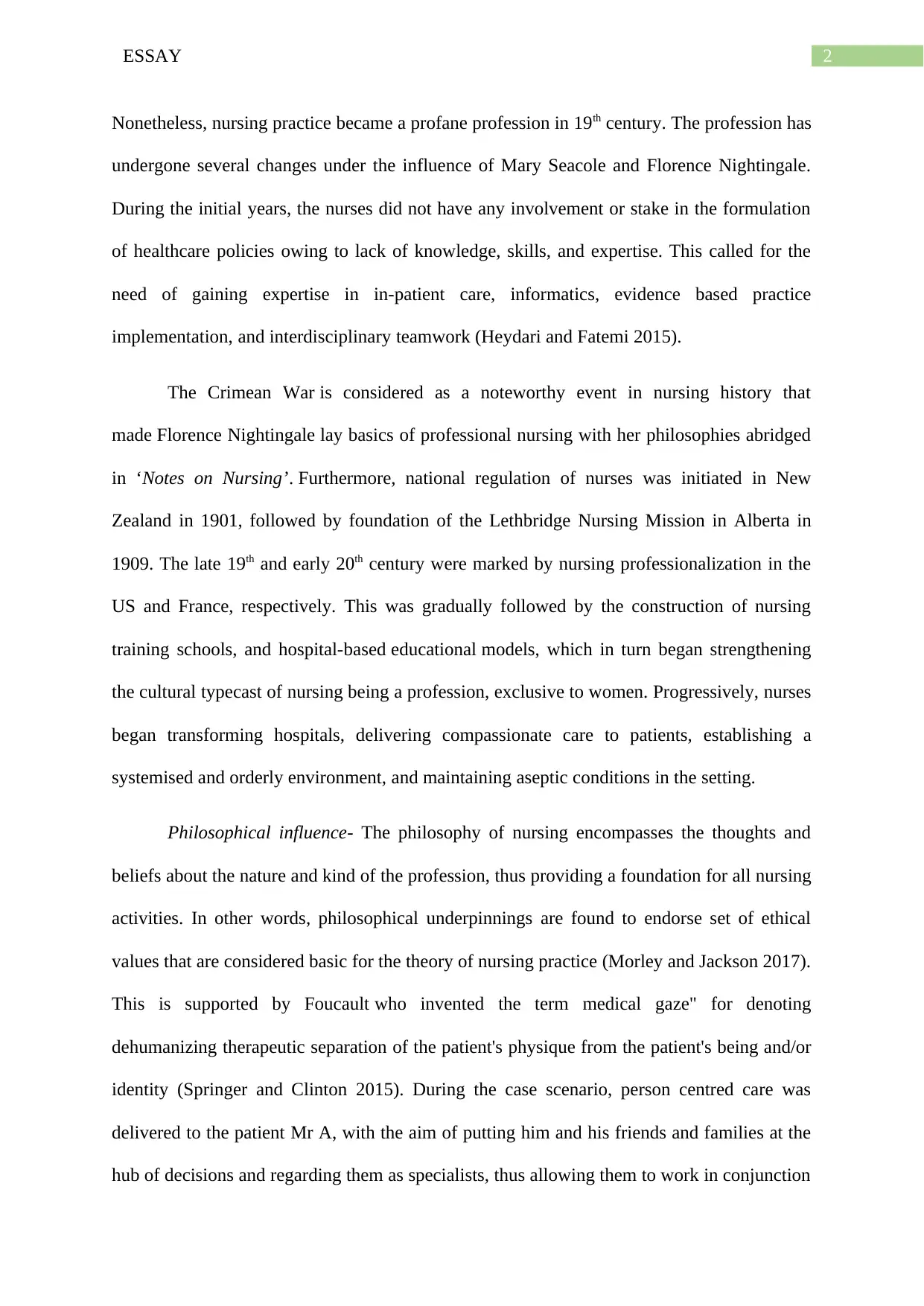
2ESSAY
Nonetheless, nursing practice became a profane profession in 19th century. The profession has
undergone several changes under the influence of Mary Seacole and Florence Nightingale.
During the initial years, the nurses did not have any involvement or stake in the formulation
of healthcare policies owing to lack of knowledge, skills, and expertise. This called for the
need of gaining expertise in in-patient care, informatics, evidence based practice
implementation, and interdisciplinary teamwork (Heydari and Fatemi 2015).
The Crimean War is considered as a noteworthy event in nursing history that
made Florence Nightingale lay basics of professional nursing with her philosophies abridged
in ‘Notes on Nursing’. Furthermore, national regulation of nurses was initiated in New
Zealand in 1901, followed by foundation of the Lethbridge Nursing Mission in Alberta in
1909. The late 19th and early 20th century were marked by nursing professionalization in the
US and France, respectively. This was gradually followed by the construction of nursing
training schools, and hospital-based educational models, which in turn began strengthening
the cultural typecast of nursing being a profession, exclusive to women. Progressively, nurses
began transforming hospitals, delivering compassionate care to patients, establishing a
systemised and orderly environment, and maintaining aseptic conditions in the setting.
Philosophical influence- The philosophy of nursing encompasses the thoughts and
beliefs about the nature and kind of the profession, thus providing a foundation for all nursing
activities. In other words, philosophical underpinnings are found to endorse set of ethical
values that are considered basic for the theory of nursing practice (Morley and Jackson 2017).
This is supported by Foucault who invented the term medical gaze" for denoting
dehumanizing therapeutic separation of the patient's physique from the patient's being and/or
identity (Springer and Clinton 2015). During the case scenario, person centred care was
delivered to the patient Mr A, with the aim of putting him and his friends and families at the
hub of decisions and regarding them as specialists, thus allowing them to work in conjunction
Nonetheless, nursing practice became a profane profession in 19th century. The profession has
undergone several changes under the influence of Mary Seacole and Florence Nightingale.
During the initial years, the nurses did not have any involvement or stake in the formulation
of healthcare policies owing to lack of knowledge, skills, and expertise. This called for the
need of gaining expertise in in-patient care, informatics, evidence based practice
implementation, and interdisciplinary teamwork (Heydari and Fatemi 2015).
The Crimean War is considered as a noteworthy event in nursing history that
made Florence Nightingale lay basics of professional nursing with her philosophies abridged
in ‘Notes on Nursing’. Furthermore, national regulation of nurses was initiated in New
Zealand in 1901, followed by foundation of the Lethbridge Nursing Mission in Alberta in
1909. The late 19th and early 20th century were marked by nursing professionalization in the
US and France, respectively. This was gradually followed by the construction of nursing
training schools, and hospital-based educational models, which in turn began strengthening
the cultural typecast of nursing being a profession, exclusive to women. Progressively, nurses
began transforming hospitals, delivering compassionate care to patients, establishing a
systemised and orderly environment, and maintaining aseptic conditions in the setting.
Philosophical influence- The philosophy of nursing encompasses the thoughts and
beliefs about the nature and kind of the profession, thus providing a foundation for all nursing
activities. In other words, philosophical underpinnings are found to endorse set of ethical
values that are considered basic for the theory of nursing practice (Morley and Jackson 2017).
This is supported by Foucault who invented the term medical gaze" for denoting
dehumanizing therapeutic separation of the patient's physique from the patient's being and/or
identity (Springer and Clinton 2015). During the case scenario, person centred care was
delivered to the patient Mr A, with the aim of putting him and his friends and families at the
hub of decisions and regarding them as specialists, thus allowing them to work in conjunction
⊘ This is a preview!⊘
Do you want full access?
Subscribe today to unlock all pages.

Trusted by 1+ million students worldwide
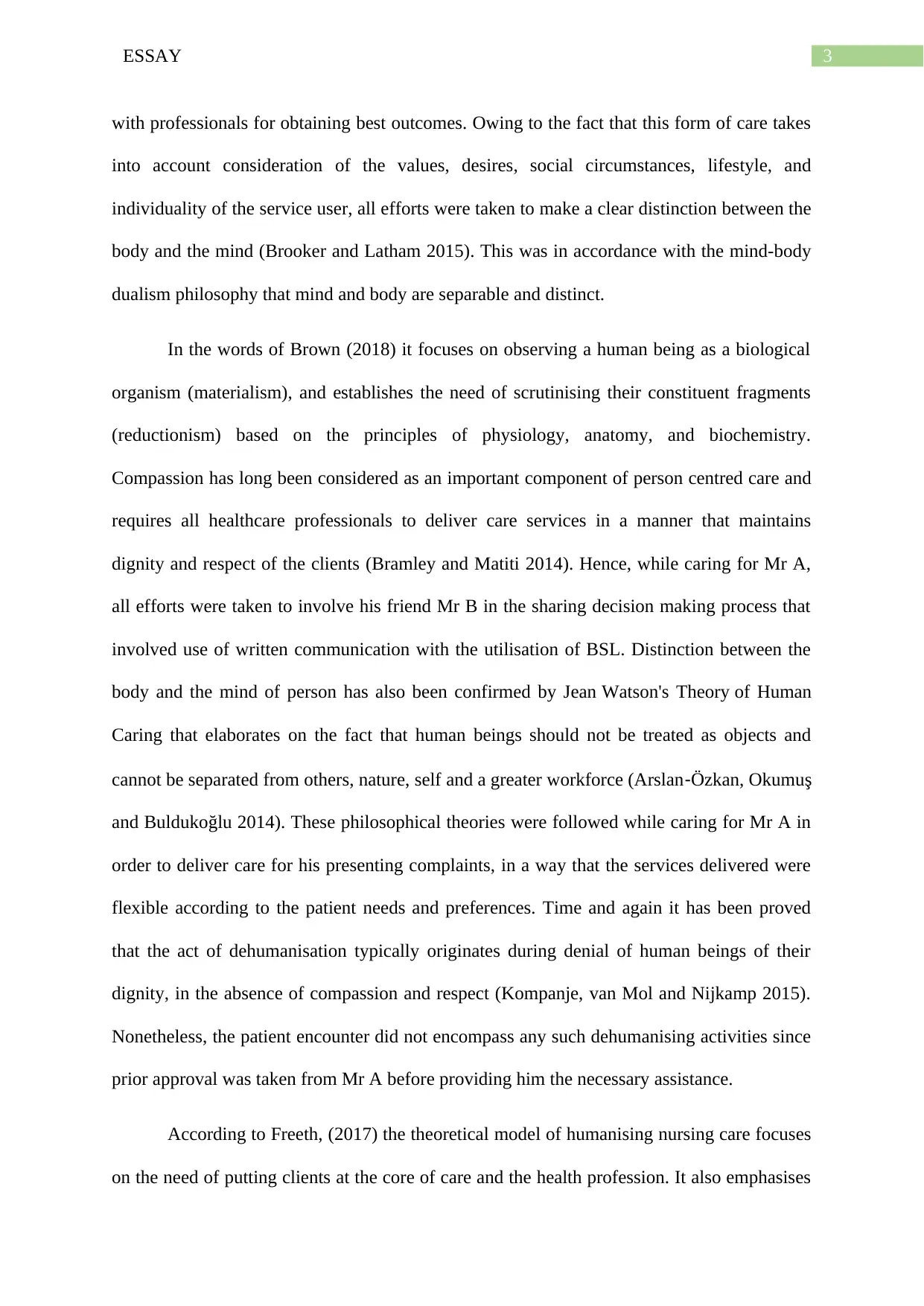
3ESSAY
with professionals for obtaining best outcomes. Owing to the fact that this form of care takes
into account consideration of the values, desires, social circumstances, lifestyle, and
individuality of the service user, all efforts were taken to make a clear distinction between the
body and the mind (Brooker and Latham 2015). This was in accordance with the mind-body
dualism philosophy that mind and body are separable and distinct.
In the words of Brown (2018) it focuses on observing a human being as a biological
organism (materialism), and establishes the need of scrutinising their constituent fragments
(reductionism) based on the principles of physiology, anatomy, and biochemistry.
Compassion has long been considered as an important component of person centred care and
requires all healthcare professionals to deliver care services in a manner that maintains
dignity and respect of the clients (Bramley and Matiti 2014). Hence, while caring for Mr A,
all efforts were taken to involve his friend Mr B in the sharing decision making process that
involved use of written communication with the utilisation of BSL. Distinction between the
body and the mind of person has also been confirmed by Jean Watson's Theory of Human
Caring that elaborates on the fact that human beings should not be treated as objects and
cannot be separated from others, nature, self and a greater workforce (Arslan‐Özkan, Okumuş
and Buldukoğlu 2014). These philosophical theories were followed while caring for Mr A in
order to deliver care for his presenting complaints, in a way that the services delivered were
flexible according to the patient needs and preferences. Time and again it has been proved
that the act of dehumanisation typically originates during denial of human beings of their
dignity, in the absence of compassion and respect (Kompanje, van Mol and Nijkamp 2015).
Nonetheless, the patient encounter did not encompass any such dehumanising activities since
prior approval was taken from Mr A before providing him the necessary assistance.
According to Freeth, (2017) the theoretical model of humanising nursing care focuses
on the need of putting clients at the core of care and the health profession. It also emphasises
with professionals for obtaining best outcomes. Owing to the fact that this form of care takes
into account consideration of the values, desires, social circumstances, lifestyle, and
individuality of the service user, all efforts were taken to make a clear distinction between the
body and the mind (Brooker and Latham 2015). This was in accordance with the mind-body
dualism philosophy that mind and body are separable and distinct.
In the words of Brown (2018) it focuses on observing a human being as a biological
organism (materialism), and establishes the need of scrutinising their constituent fragments
(reductionism) based on the principles of physiology, anatomy, and biochemistry.
Compassion has long been considered as an important component of person centred care and
requires all healthcare professionals to deliver care services in a manner that maintains
dignity and respect of the clients (Bramley and Matiti 2014). Hence, while caring for Mr A,
all efforts were taken to involve his friend Mr B in the sharing decision making process that
involved use of written communication with the utilisation of BSL. Distinction between the
body and the mind of person has also been confirmed by Jean Watson's Theory of Human
Caring that elaborates on the fact that human beings should not be treated as objects and
cannot be separated from others, nature, self and a greater workforce (Arslan‐Özkan, Okumuş
and Buldukoğlu 2014). These philosophical theories were followed while caring for Mr A in
order to deliver care for his presenting complaints, in a way that the services delivered were
flexible according to the patient needs and preferences. Time and again it has been proved
that the act of dehumanisation typically originates during denial of human beings of their
dignity, in the absence of compassion and respect (Kompanje, van Mol and Nijkamp 2015).
Nonetheless, the patient encounter did not encompass any such dehumanising activities since
prior approval was taken from Mr A before providing him the necessary assistance.
According to Freeth, (2017) the theoretical model of humanising nursing care focuses
on the need of putting clients at the core of care and the health profession. It also emphasises
Paraphrase This Document
Need a fresh take? Get an instant paraphrase of this document with our AI Paraphraser
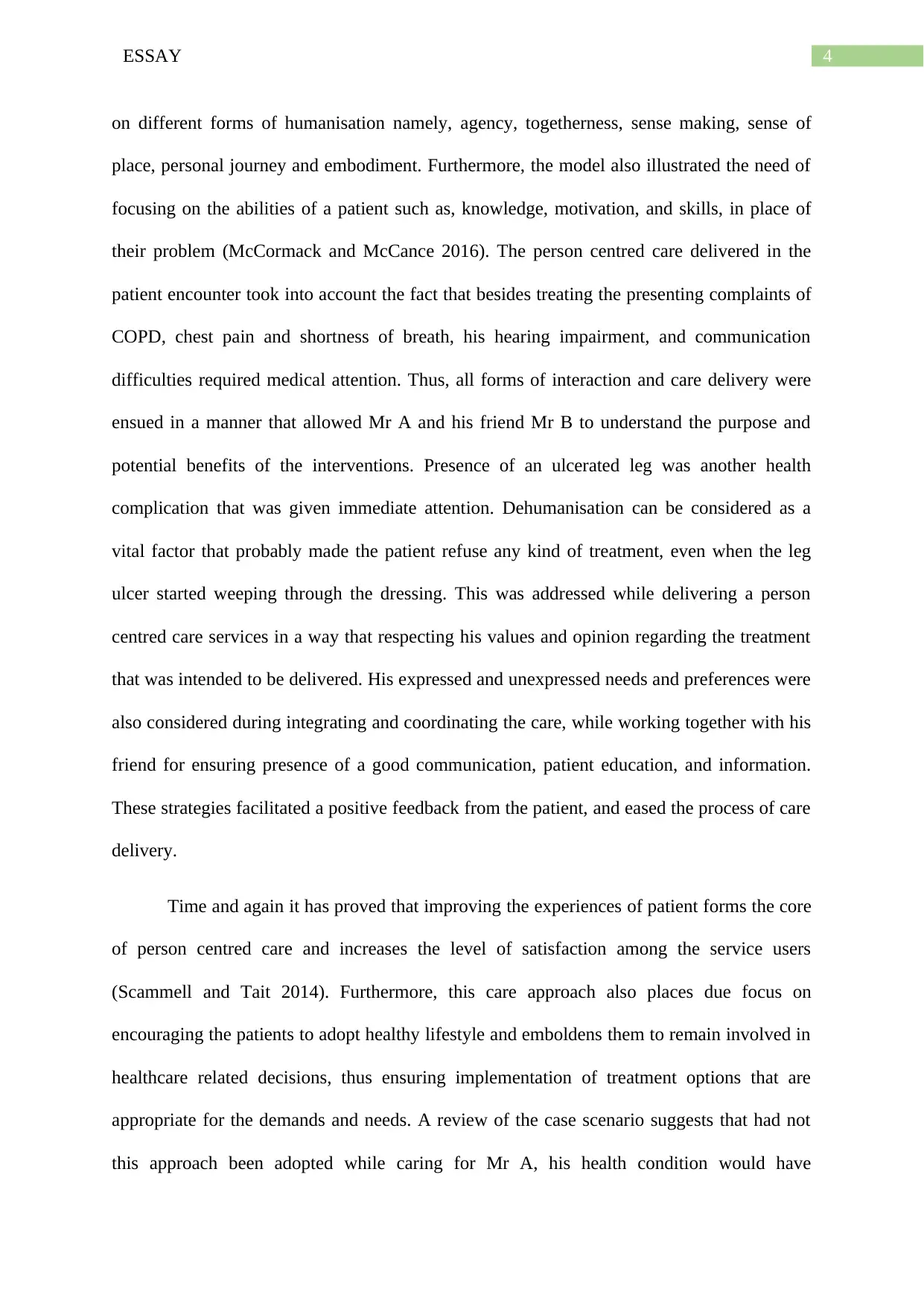
4ESSAY
on different forms of humanisation namely, agency, togetherness, sense making, sense of
place, personal journey and embodiment. Furthermore, the model also illustrated the need of
focusing on the abilities of a patient such as, knowledge, motivation, and skills, in place of
their problem (McCormack and McCance 2016). The person centred care delivered in the
patient encounter took into account the fact that besides treating the presenting complaints of
COPD, chest pain and shortness of breath, his hearing impairment, and communication
difficulties required medical attention. Thus, all forms of interaction and care delivery were
ensued in a manner that allowed Mr A and his friend Mr B to understand the purpose and
potential benefits of the interventions. Presence of an ulcerated leg was another health
complication that was given immediate attention. Dehumanisation can be considered as a
vital factor that probably made the patient refuse any kind of treatment, even when the leg
ulcer started weeping through the dressing. This was addressed while delivering a person
centred care services in a way that respecting his values and opinion regarding the treatment
that was intended to be delivered. His expressed and unexpressed needs and preferences were
also considered during integrating and coordinating the care, while working together with his
friend for ensuring presence of a good communication, patient education, and information.
These strategies facilitated a positive feedback from the patient, and eased the process of care
delivery.
Time and again it has proved that improving the experiences of patient forms the core
of person centred care and increases the level of satisfaction among the service users
(Scammell and Tait 2014). Furthermore, this care approach also places due focus on
encouraging the patients to adopt healthy lifestyle and emboldens them to remain involved in
healthcare related decisions, thus ensuring implementation of treatment options that are
appropriate for the demands and needs. A review of the case scenario suggests that had not
this approach been adopted while caring for Mr A, his health condition would have
on different forms of humanisation namely, agency, togetherness, sense making, sense of
place, personal journey and embodiment. Furthermore, the model also illustrated the need of
focusing on the abilities of a patient such as, knowledge, motivation, and skills, in place of
their problem (McCormack and McCance 2016). The person centred care delivered in the
patient encounter took into account the fact that besides treating the presenting complaints of
COPD, chest pain and shortness of breath, his hearing impairment, and communication
difficulties required medical attention. Thus, all forms of interaction and care delivery were
ensued in a manner that allowed Mr A and his friend Mr B to understand the purpose and
potential benefits of the interventions. Presence of an ulcerated leg was another health
complication that was given immediate attention. Dehumanisation can be considered as a
vital factor that probably made the patient refuse any kind of treatment, even when the leg
ulcer started weeping through the dressing. This was addressed while delivering a person
centred care services in a way that respecting his values and opinion regarding the treatment
that was intended to be delivered. His expressed and unexpressed needs and preferences were
also considered during integrating and coordinating the care, while working together with his
friend for ensuring presence of a good communication, patient education, and information.
These strategies facilitated a positive feedback from the patient, and eased the process of care
delivery.
Time and again it has proved that improving the experiences of patient forms the core
of person centred care and increases the level of satisfaction among the service users
(Scammell and Tait 2014). Furthermore, this care approach also places due focus on
encouraging the patients to adopt healthy lifestyle and emboldens them to remain involved in
healthcare related decisions, thus ensuring implementation of treatment options that are
appropriate for the demands and needs. A review of the case scenario suggests that had not
this approach been adopted while caring for Mr A, his health condition would have
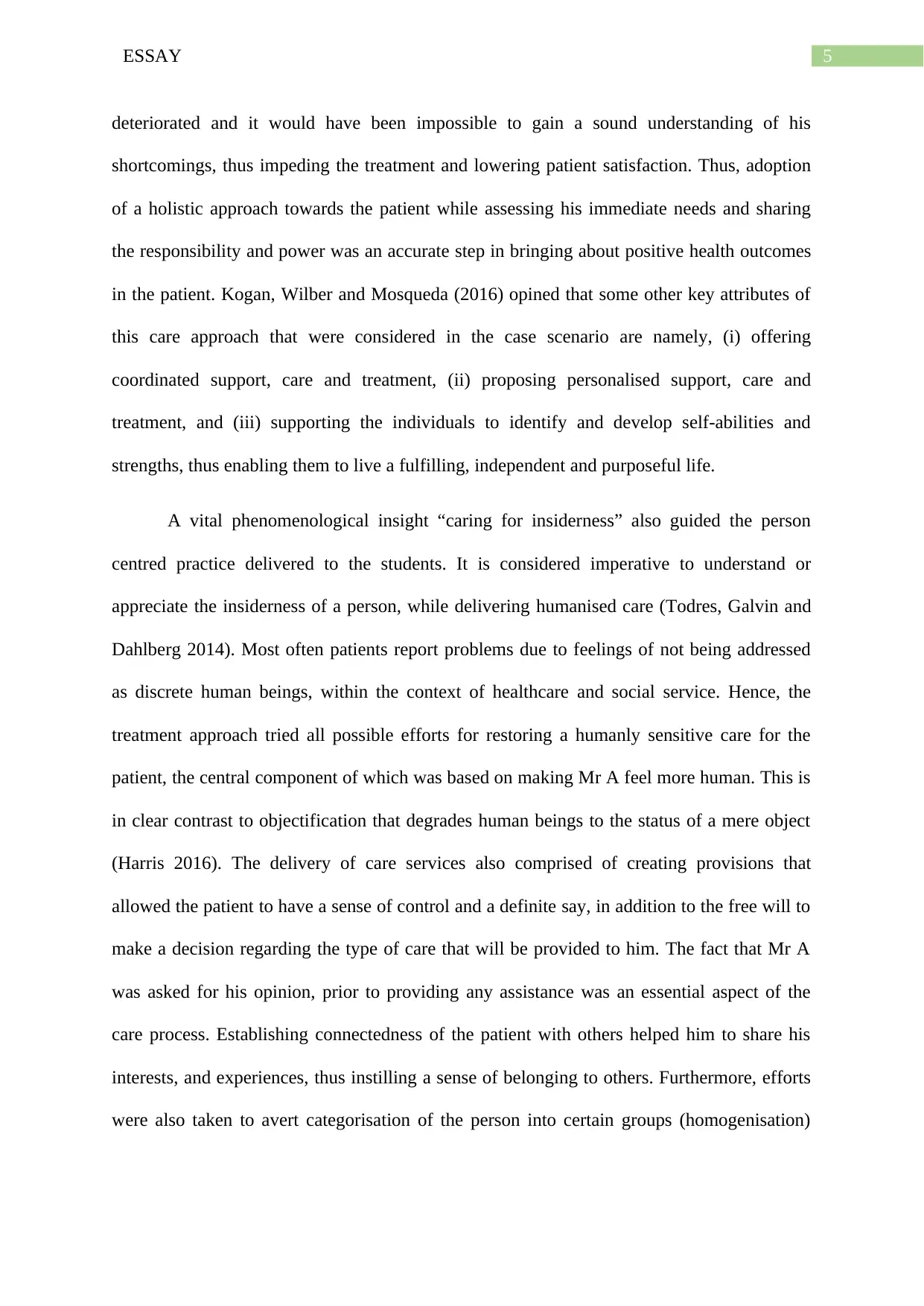
5ESSAY
deteriorated and it would have been impossible to gain a sound understanding of his
shortcomings, thus impeding the treatment and lowering patient satisfaction. Thus, adoption
of a holistic approach towards the patient while assessing his immediate needs and sharing
the responsibility and power was an accurate step in bringing about positive health outcomes
in the patient. Kogan, Wilber and Mosqueda (2016) opined that some other key attributes of
this care approach that were considered in the case scenario are namely, (i) offering
coordinated support, care and treatment, (ii) proposing personalised support, care and
treatment, and (iii) supporting the individuals to identify and develop self-abilities and
strengths, thus enabling them to live a fulfilling, independent and purposeful life.
A vital phenomenological insight “caring for insiderness” also guided the person
centred practice delivered to the students. It is considered imperative to understand or
appreciate the insiderness of a person, while delivering humanised care (Todres, Galvin and
Dahlberg 2014). Most often patients report problems due to feelings of not being addressed
as discrete human beings, within the context of healthcare and social service. Hence, the
treatment approach tried all possible efforts for restoring a humanly sensitive care for the
patient, the central component of which was based on making Mr A feel more human. This is
in clear contrast to objectification that degrades human beings to the status of a mere object
(Harris 2016). The delivery of care services also comprised of creating provisions that
allowed the patient to have a sense of control and a definite say, in addition to the free will to
make a decision regarding the type of care that will be provided to him. The fact that Mr A
was asked for his opinion, prior to providing any assistance was an essential aspect of the
care process. Establishing connectedness of the patient with others helped him to share his
interests, and experiences, thus instilling a sense of belonging to others. Furthermore, efforts
were also taken to avert categorisation of the person into certain groups (homogenisation)
deteriorated and it would have been impossible to gain a sound understanding of his
shortcomings, thus impeding the treatment and lowering patient satisfaction. Thus, adoption
of a holistic approach towards the patient while assessing his immediate needs and sharing
the responsibility and power was an accurate step in bringing about positive health outcomes
in the patient. Kogan, Wilber and Mosqueda (2016) opined that some other key attributes of
this care approach that were considered in the case scenario are namely, (i) offering
coordinated support, care and treatment, (ii) proposing personalised support, care and
treatment, and (iii) supporting the individuals to identify and develop self-abilities and
strengths, thus enabling them to live a fulfilling, independent and purposeful life.
A vital phenomenological insight “caring for insiderness” also guided the person
centred practice delivered to the students. It is considered imperative to understand or
appreciate the insiderness of a person, while delivering humanised care (Todres, Galvin and
Dahlberg 2014). Most often patients report problems due to feelings of not being addressed
as discrete human beings, within the context of healthcare and social service. Hence, the
treatment approach tried all possible efforts for restoring a humanly sensitive care for the
patient, the central component of which was based on making Mr A feel more human. This is
in clear contrast to objectification that degrades human beings to the status of a mere object
(Harris 2016). The delivery of care services also comprised of creating provisions that
allowed the patient to have a sense of control and a definite say, in addition to the free will to
make a decision regarding the type of care that will be provided to him. The fact that Mr A
was asked for his opinion, prior to providing any assistance was an essential aspect of the
care process. Establishing connectedness of the patient with others helped him to share his
interests, and experiences, thus instilling a sense of belonging to others. Furthermore, efforts
were also taken to avert categorisation of the person into certain groups (homogenisation)
⊘ This is a preview!⊘
Do you want full access?
Subscribe today to unlock all pages.

Trusted by 1+ million students worldwide
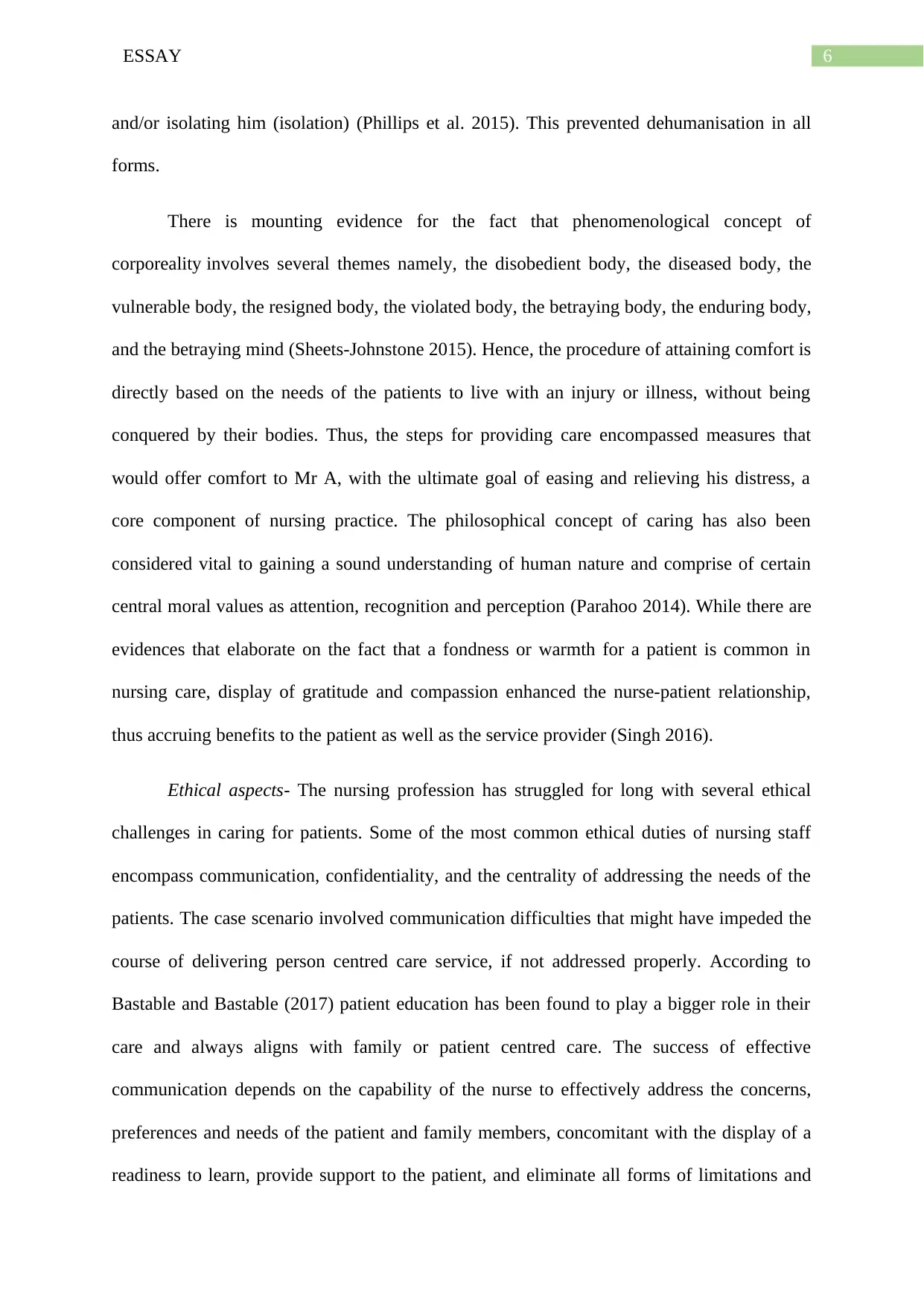
6ESSAY
and/or isolating him (isolation) (Phillips et al. 2015). This prevented dehumanisation in all
forms.
There is mounting evidence for the fact that phenomenological concept of
corporeality involves several themes namely, the disobedient body, the diseased body, the
vulnerable body, the resigned body, the violated body, the betraying body, the enduring body,
and the betraying mind (Sheets-Johnstone 2015). Hence, the procedure of attaining comfort is
directly based on the needs of the patients to live with an injury or illness, without being
conquered by their bodies. Thus, the steps for providing care encompassed measures that
would offer comfort to Mr A, with the ultimate goal of easing and relieving his distress, a
core component of nursing practice. The philosophical concept of caring has also been
considered vital to gaining a sound understanding of human nature and comprise of certain
central moral values as attention, recognition and perception (Parahoo 2014). While there are
evidences that elaborate on the fact that a fondness or warmth for a patient is common in
nursing care, display of gratitude and compassion enhanced the nurse-patient relationship,
thus accruing benefits to the patient as well as the service provider (Singh 2016).
Ethical aspects- The nursing profession has struggled for long with several ethical
challenges in caring for patients. Some of the most common ethical duties of nursing staff
encompass communication, confidentiality, and the centrality of addressing the needs of the
patients. The case scenario involved communication difficulties that might have impeded the
course of delivering person centred care service, if not addressed properly. According to
Bastable and Bastable (2017) patient education has been found to play a bigger role in their
care and always aligns with family or patient centred care. The success of effective
communication depends on the capability of the nurse to effectively address the concerns,
preferences and needs of the patient and family members, concomitant with the display of a
readiness to learn, provide support to the patient, and eliminate all forms of limitations and
and/or isolating him (isolation) (Phillips et al. 2015). This prevented dehumanisation in all
forms.
There is mounting evidence for the fact that phenomenological concept of
corporeality involves several themes namely, the disobedient body, the diseased body, the
vulnerable body, the resigned body, the violated body, the betraying body, the enduring body,
and the betraying mind (Sheets-Johnstone 2015). Hence, the procedure of attaining comfort is
directly based on the needs of the patients to live with an injury or illness, without being
conquered by their bodies. Thus, the steps for providing care encompassed measures that
would offer comfort to Mr A, with the ultimate goal of easing and relieving his distress, a
core component of nursing practice. The philosophical concept of caring has also been
considered vital to gaining a sound understanding of human nature and comprise of certain
central moral values as attention, recognition and perception (Parahoo 2014). While there are
evidences that elaborate on the fact that a fondness or warmth for a patient is common in
nursing care, display of gratitude and compassion enhanced the nurse-patient relationship,
thus accruing benefits to the patient as well as the service provider (Singh 2016).
Ethical aspects- The nursing profession has struggled for long with several ethical
challenges in caring for patients. Some of the most common ethical duties of nursing staff
encompass communication, confidentiality, and the centrality of addressing the needs of the
patients. The case scenario involved communication difficulties that might have impeded the
course of delivering person centred care service, if not addressed properly. According to
Bastable and Bastable (2017) patient education has been found to play a bigger role in their
care and always aligns with family or patient centred care. The success of effective
communication depends on the capability of the nurse to effectively address the concerns,
preferences and needs of the patient and family members, concomitant with the display of a
readiness to learn, provide support to the patient, and eliminate all forms of limitations and
Paraphrase This Document
Need a fresh take? Get an instant paraphrase of this document with our AI Paraphraser

7ESSAY
barriers (Arnold and Boggs 2015). Gathering cues from Mr B and observing the patient
averted making any assumptions regarding patient health status. Furthermore, efforts were
taken to introduce oneself to the patient, besides explaining the role in patient care. Gaining
patient trust by demonstrating respect and treating him with compassion, in a non-judgmental
manner, eased establishment of a rapport and allowed paying attention to the concerns
(Rutherford 2014). Active listening skills also helped in learning about the perspective of the
patient and his friend, thus providing a clear insight on the steps that need to be followed to
achieve optimal health outcomes. In the words of Butler, Copnell and Willetts (2014)
members of the patient’s family or acquaintances are often recommended to visit the hospital
for preventing solitude and reducing the terror of being in a bizarre environment. Ethical
concerns were also addressed when the hospital guidelines for management of leg ulcer were
appropriately followed. This helped in ensuring that adequate steps were taken for grading,
reporting and recording his ulcer. Conduction of further assessment by a Tissue Viability
nurse helped in obtaining specialist advice regarding care for the patient with a complex
wound, besides supporting and educating him on ways that can help in management of the
condition (Ousey et al. 2014). The details of the patient and his friend were also not disclosed
and they were addressed with pseudonym, thus establishing a confidential relationship for
sound medical care, which forms one of the core duties of medical practice (Baird et al.
2014).
Recommendations- Care should be delivered in accordance to the professional
standards of practice, by placing due focus on four themes namely, practise effectively,
reserve safety, prioritise people, and promote professionalism and trust. The interests of the
service users must be put in priority, by considering their safety and care as the major
concern, while preserving their dignity (NHS 2015). There is a need to identify, assess and
respond to the needs of all patients and upholding any form of discriminatory behaviour or
barriers (Arnold and Boggs 2015). Gathering cues from Mr B and observing the patient
averted making any assumptions regarding patient health status. Furthermore, efforts were
taken to introduce oneself to the patient, besides explaining the role in patient care. Gaining
patient trust by demonstrating respect and treating him with compassion, in a non-judgmental
manner, eased establishment of a rapport and allowed paying attention to the concerns
(Rutherford 2014). Active listening skills also helped in learning about the perspective of the
patient and his friend, thus providing a clear insight on the steps that need to be followed to
achieve optimal health outcomes. In the words of Butler, Copnell and Willetts (2014)
members of the patient’s family or acquaintances are often recommended to visit the hospital
for preventing solitude and reducing the terror of being in a bizarre environment. Ethical
concerns were also addressed when the hospital guidelines for management of leg ulcer were
appropriately followed. This helped in ensuring that adequate steps were taken for grading,
reporting and recording his ulcer. Conduction of further assessment by a Tissue Viability
nurse helped in obtaining specialist advice regarding care for the patient with a complex
wound, besides supporting and educating him on ways that can help in management of the
condition (Ousey et al. 2014). The details of the patient and his friend were also not disclosed
and they were addressed with pseudonym, thus establishing a confidential relationship for
sound medical care, which forms one of the core duties of medical practice (Baird et al.
2014).
Recommendations- Care should be delivered in accordance to the professional
standards of practice, by placing due focus on four themes namely, practise effectively,
reserve safety, prioritise people, and promote professionalism and trust. The interests of the
service users must be put in priority, by considering their safety and care as the major
concern, while preserving their dignity (NHS 2015). There is a need to identify, assess and
respond to the needs of all patients and upholding any form of discriminatory behaviour or

8ESSAY
attitude, while caring for them. Contemporary nursing practice must enhance the experiences
of the patients by making them feel more satisfied, besides involving key stakeholders in the
planning and evaluating activities. Obtaining regular feedback from the patients and allied
health professionals, and finding out the areas that are considered vital for the client will
facilitate improvement of care quality. Existing barriers in communication with clients must
also be eliminated by asking right questions, learning about the skills of the patient, adopting
a teach-back method, and expressing compassion throughout the treatment process. The
guidelines of the hospital “Vision, Values and Strategic Goals”, must also be shown
compliance to, while delivering high quality services to the patients, and creating an
environment where they are able to thrive in (Royal Wolverhampton NHS Trust 2018).
According to the Royal College Nursing (2018) persons under medical care must be treated
as discrete entities and their self-esteem must be treasured and appreciated. This calls for the
need of delivering a high standard of care service to all patients in current and future nursing
practice, with the aim of enhancing the health and wellbeing.
Conclusion- To conclude, the case scenario was a correct representation of person
centred care and involved a collaborative approach from the healthcare staff, while enhancing
the health of Mr A. The history of nursing is complete with accounts of healing, fostering,
hardships, intrepidness, discovery, resourcefulness, caring, concern, tutoring, research, and
management. Person centred care encompasses the manner of doing and thinking things, in
relation to service users who utilise healthcare and social services, while adorning the role of
equal partners in the process. Nursing as a person comprises of the fact that several persons
are the recipients of nursing care and also encompass their friends and family. In other words,
nursing metaparadigm are defined in the form of a set of ideas and proposals that set out the
occurrences with which the domain is concerned. Effective communication, involvement of
the patient’s friend, demonstration of respect and dignity, humanising the offered services
attitude, while caring for them. Contemporary nursing practice must enhance the experiences
of the patients by making them feel more satisfied, besides involving key stakeholders in the
planning and evaluating activities. Obtaining regular feedback from the patients and allied
health professionals, and finding out the areas that are considered vital for the client will
facilitate improvement of care quality. Existing barriers in communication with clients must
also be eliminated by asking right questions, learning about the skills of the patient, adopting
a teach-back method, and expressing compassion throughout the treatment process. The
guidelines of the hospital “Vision, Values and Strategic Goals”, must also be shown
compliance to, while delivering high quality services to the patients, and creating an
environment where they are able to thrive in (Royal Wolverhampton NHS Trust 2018).
According to the Royal College Nursing (2018) persons under medical care must be treated
as discrete entities and their self-esteem must be treasured and appreciated. This calls for the
need of delivering a high standard of care service to all patients in current and future nursing
practice, with the aim of enhancing the health and wellbeing.
Conclusion- To conclude, the case scenario was a correct representation of person
centred care and involved a collaborative approach from the healthcare staff, while enhancing
the health of Mr A. The history of nursing is complete with accounts of healing, fostering,
hardships, intrepidness, discovery, resourcefulness, caring, concern, tutoring, research, and
management. Person centred care encompasses the manner of doing and thinking things, in
relation to service users who utilise healthcare and social services, while adorning the role of
equal partners in the process. Nursing as a person comprises of the fact that several persons
are the recipients of nursing care and also encompass their friends and family. In other words,
nursing metaparadigm are defined in the form of a set of ideas and proposals that set out the
occurrences with which the domain is concerned. Effective communication, involvement of
the patient’s friend, demonstration of respect and dignity, humanising the offered services
⊘ This is a preview!⊘
Do you want full access?
Subscribe today to unlock all pages.

Trusted by 1+ million students worldwide

9ESSAY
and adherence to nursing codes were some essential attributes that allowed the professionals
to treat the patient.
References
Arnold, E.C. and Boggs, K.U., 2015. Interpersonal Relationships-E-Book: Professional
Communication Skills for Nurses. Elsevier Health Sciences.
Arslan‐Özkan, İ., Okumuş, H. and Buldukoğlu, K., 2014. A randomized controlled trial of the
effects of nursing care based on Watson's Theory of Human Caring on distress, self‐efficacy
and adjustment in infertile women. Journal of advanced nursing, 70(8), pp.1801-1812.
Baird, M., Blount, A., Brungardt, S., Dickinson, P., Dietrich, A., Epperly, T., Green, L.,
Henley, D., Kessler, R., Korsen, N. and McDaniel, S., 2014. Joint principles: integrating
behavioral health care into the patient-centered medical home. The Annals of Family
Medicine, 12(2), pp.183-185.
Bastable, S.B. and Bastable, S.B., 2017. Essentials of patient education. Jones & Bartlett
Learning.
Bramley, L. and Matiti, M., 2014. How does it really feel to be in my shoes? Patients'
experiences of compassion within nursing care and their perceptions of developing
compassionate nurses. Journal of clinical nursing, 23(19-20), pp.2790-2799.
Brooker, D. and Latham, I., 2015. Person-centred dementia care: Making services better
with the VIPS framework. Jessica Kingsley Publishers.
and adherence to nursing codes were some essential attributes that allowed the professionals
to treat the patient.
References
Arnold, E.C. and Boggs, K.U., 2015. Interpersonal Relationships-E-Book: Professional
Communication Skills for Nurses. Elsevier Health Sciences.
Arslan‐Özkan, İ., Okumuş, H. and Buldukoğlu, K., 2014. A randomized controlled trial of the
effects of nursing care based on Watson's Theory of Human Caring on distress, self‐efficacy
and adjustment in infertile women. Journal of advanced nursing, 70(8), pp.1801-1812.
Baird, M., Blount, A., Brungardt, S., Dickinson, P., Dietrich, A., Epperly, T., Green, L.,
Henley, D., Kessler, R., Korsen, N. and McDaniel, S., 2014. Joint principles: integrating
behavioral health care into the patient-centered medical home. The Annals of Family
Medicine, 12(2), pp.183-185.
Bastable, S.B. and Bastable, S.B., 2017. Essentials of patient education. Jones & Bartlett
Learning.
Bramley, L. and Matiti, M., 2014. How does it really feel to be in my shoes? Patients'
experiences of compassion within nursing care and their perceptions of developing
compassionate nurses. Journal of clinical nursing, 23(19-20), pp.2790-2799.
Brooker, D. and Latham, I., 2015. Person-centred dementia care: Making services better
with the VIPS framework. Jessica Kingsley Publishers.
Paraphrase This Document
Need a fresh take? Get an instant paraphrase of this document with our AI Paraphraser

10ESSAY
Brown, T.M., 2018. Descartes, dualism, and psychosomatic medicine. In Anatomy Of
Madness Vol 1 (pp. 40-62). Routledge.
Butler, A., Copnell, B. and Willetts, G., 2014. Family‐centred care in the paediatric intensive
care unit: an integrative review of the literature. Journal of clinical nursing, 23(15-16),
pp.2086-2100.
Egenes, K.J., 2017. History of nursing. Issues and trends in nursing: Essential knowledge for
today and tomorrow, pp.1-26.
Freeth, R., 2017. Humanising psychiatry and mental health care: the challenge of the
person-centred approach. CRC Press.
Harris, D.L., 2016. Iatrogenic harm and objectification in the context of care
delivery. Handbook of social justice in loss and grief: Exploring diversity, equity, and
inclusion, Routledge, New York, pp.125-137.
Heydari, A. and Fatemi, S.N.L., 2015. Nursing developments in Iran during World Wars I &
II: A historical study. Journal of Nursing and Midwifery Sciences, 2(1), pp.1-8.
Kogan, A.C., Wilber, K. and Mosqueda, L., 2016. Person‐centered care for older adults with
chronic conditions and functional impairment: A systematic literature review. Journal of the
American Geriatrics Society, 64(1), pp.e1-e7.
Kompanje, E.J., van Mol, M.M. and Nijkamp, M.D., 2015. ‘I just have admitted an
interesting sepsis’. Do we dehumanize our patients?. Intensive care medicine, 41(12),
pp.2193-2194.
McCormack, B. and McCance, T. eds., 2016. Person-centred practice in nursing and health
care: Theory and practice. John Wiley & Sons.
Brown, T.M., 2018. Descartes, dualism, and psychosomatic medicine. In Anatomy Of
Madness Vol 1 (pp. 40-62). Routledge.
Butler, A., Copnell, B. and Willetts, G., 2014. Family‐centred care in the paediatric intensive
care unit: an integrative review of the literature. Journal of clinical nursing, 23(15-16),
pp.2086-2100.
Egenes, K.J., 2017. History of nursing. Issues and trends in nursing: Essential knowledge for
today and tomorrow, pp.1-26.
Freeth, R., 2017. Humanising psychiatry and mental health care: the challenge of the
person-centred approach. CRC Press.
Harris, D.L., 2016. Iatrogenic harm and objectification in the context of care
delivery. Handbook of social justice in loss and grief: Exploring diversity, equity, and
inclusion, Routledge, New York, pp.125-137.
Heydari, A. and Fatemi, S.N.L., 2015. Nursing developments in Iran during World Wars I &
II: A historical study. Journal of Nursing and Midwifery Sciences, 2(1), pp.1-8.
Kogan, A.C., Wilber, K. and Mosqueda, L., 2016. Person‐centered care for older adults with
chronic conditions and functional impairment: A systematic literature review. Journal of the
American Geriatrics Society, 64(1), pp.e1-e7.
Kompanje, E.J., van Mol, M.M. and Nijkamp, M.D., 2015. ‘I just have admitted an
interesting sepsis’. Do we dehumanize our patients?. Intensive care medicine, 41(12),
pp.2193-2194.
McCormack, B. and McCance, T. eds., 2016. Person-centred practice in nursing and health
care: Theory and practice. John Wiley & Sons.

11ESSAY
Morley, G. and Jackson, J., 2017. Is the art of nursing dying? A call for political
action. Journal of Research in Nursing, 22(5), pp.342-351.
Nursing and Midwifery Council., 2015. The Code- Professional standards of practice and
behaviour for nurses, midwives and nursing associates. Available from
https://www.nmc.org.uk/globalassets/sitedocuments/nmc-publications/nmc-code.pdf Accesse
d on 04 January 2018.
Ousey, K., Atkin, L., Milne, J. and Henderson, V., 2014. The changing role of the tissue
viability nurse: an exploration of this multifaceted post. Wounds UK, 10(4), pp.54-61.
Parahoo, K., 2014. Nursing research: principles, process and issues. Macmillan International
Higher Education.
Phillips, J., Cooper, K., Rosser, E., Scammell, J., Heaslip, V., White, S., Donaldson, I., Jack,
E., Hemingway, A. and Harding, A., 2015. An exploration of the perceptions of caring held
by students entering nursing programmes in the United Kingdom: A longitudinal qualitative
study phase 1. Nurse education in practice, 15(6), pp.403-408.
Royal College of Nursing., 2018. About the RCN. Available from
https://www.rcn.org.uk/ Accessed on 04 January 2018.
Royal Wolverhampton NHS Trust., 2018. Our Visions and Values. Available from
https://www.royalwolverhampton.nhs.uk/about-us/our-visions-and-values/ Accessed on 04
January 2018.
Rutherford, M.M., 2014. The value of trust to nursing. Nursing Economics, 32(6), p.283.
Scammell, J. and Tait, D., 2014. Using humanising values to support care. Nursing
times, 110(15), pp.16-18.
Morley, G. and Jackson, J., 2017. Is the art of nursing dying? A call for political
action. Journal of Research in Nursing, 22(5), pp.342-351.
Nursing and Midwifery Council., 2015. The Code- Professional standards of practice and
behaviour for nurses, midwives and nursing associates. Available from
https://www.nmc.org.uk/globalassets/sitedocuments/nmc-publications/nmc-code.pdf Accesse
d on 04 January 2018.
Ousey, K., Atkin, L., Milne, J. and Henderson, V., 2014. The changing role of the tissue
viability nurse: an exploration of this multifaceted post. Wounds UK, 10(4), pp.54-61.
Parahoo, K., 2014. Nursing research: principles, process and issues. Macmillan International
Higher Education.
Phillips, J., Cooper, K., Rosser, E., Scammell, J., Heaslip, V., White, S., Donaldson, I., Jack,
E., Hemingway, A. and Harding, A., 2015. An exploration of the perceptions of caring held
by students entering nursing programmes in the United Kingdom: A longitudinal qualitative
study phase 1. Nurse education in practice, 15(6), pp.403-408.
Royal College of Nursing., 2018. About the RCN. Available from
https://www.rcn.org.uk/ Accessed on 04 January 2018.
Royal Wolverhampton NHS Trust., 2018. Our Visions and Values. Available from
https://www.royalwolverhampton.nhs.uk/about-us/our-visions-and-values/ Accessed on 04
January 2018.
Rutherford, M.M., 2014. The value of trust to nursing. Nursing Economics, 32(6), p.283.
Scammell, J. and Tait, D., 2014. Using humanising values to support care. Nursing
times, 110(15), pp.16-18.
⊘ This is a preview!⊘
Do you want full access?
Subscribe today to unlock all pages.

Trusted by 1+ million students worldwide
1 out of 13
Related Documents
Your All-in-One AI-Powered Toolkit for Academic Success.
+13062052269
info@desklib.com
Available 24*7 on WhatsApp / Email
![[object Object]](/_next/static/media/star-bottom.7253800d.svg)
Unlock your academic potential
Copyright © 2020–2026 A2Z Services. All Rights Reserved. Developed and managed by ZUCOL.



